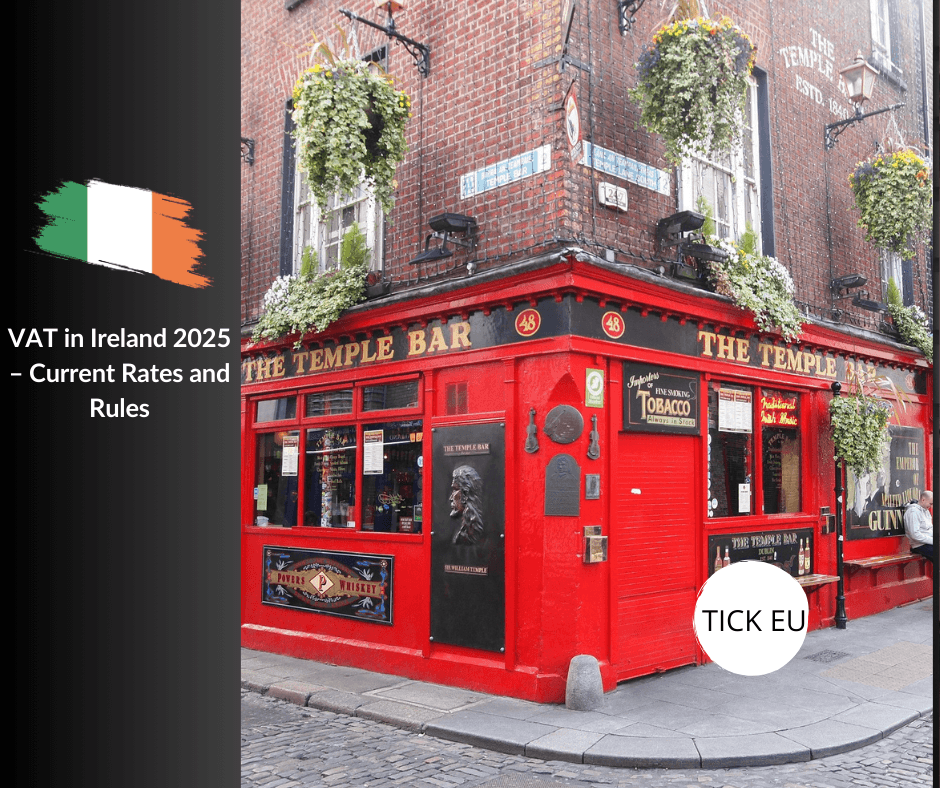VAT in Ireland – Current Rates and Rules
VAT is a mandatory tax on most goods and services sold in Ireland. Whether you run a business, plan to export, or just want to know how much you will pay in a store, it’s important to be familiar with the current VAT rates and rules. In 2025, Ireland maintains its existing system, with a few exceptions for sectors such as energy and tourism.
What VAT rates apply in Ireland?
The standard VAT rate in Ireland is 23%. It applies to most products and services – from electronics and cosmetics to consulting services. This is the main level of taxation.
Alongside it, there are reduced rates:
- 13.5% – applied, among others, to construction services, catering (excluding alcohol), accommodation, hairdressing, and energy supply. This rate is often used for local services.
- 9% – applies to press, cultural events, tourism, certain food products, and sports and recreational services. In 2025, it also temporarily covers electricity and gas.
- 4.8% – a special rate for animal breeding. In practice, it applies only to certain agricultural entities.
- 0% – applies to exports outside the European Union, as well as sales of books, baby food, children’s clothing, medical equipment, and several other categories.
This differentiation of VAT rates in Ireland keeps prices of certain services and products lower, especially those considered essential.
Temporary Energy Tax Relief – Important Change in 2025
From May 1 to October 31, 2025, a reduced 9% VAT rate applies to electricity and gas. This is the government’s response to high bills and the rising cost of living. The same rate also applies to the supply and installation of heat pumps, supporting eco-friendly initiatives. If your business operates in the energy or renewable sector, it’s important to consider this change in your accounting.
When is VAT registration required in Ireland?
Any business selling in the Irish market, regardless of where it is based, must register for VAT if it exceeds a certain revenue threshold:
- €37,500 per year for services
- €75,000 per year for goods
Registration is done through the Irish Revenue, obtaining a VAT number starting with “IE.”
VAT Accounting – How it Works in Practice
VAT returns in Ireland are usually submitted every two months. The deadline is the 19th day of the month following the reporting period. If you use the ROS (Revenue Online Service) system, you get a few additional days. ROS allows convenient online management of VAT filings and is mandatory for most VAT-registered businesses.
Special Rules for Farmers
Farmers who are not active VAT taxpayers can use the compensation system. They receive a VAT refund as a flat-rate addition of 5.1%. This simplifies accounting for farms without requiring standard VAT registration.
Future Plans – ViDA Reform
In 2027, Ireland, like the rest of the EU, will adopt the VAT in the Digital Age (ViDA) system. The new rules will simplify international VAT accounting, introducing unified registration within the EU and new reporting obligations. Key implementation dates:
- January 1, 2027 – Update of OSS and IOSS rules, including the expansion of OSS to energy supplies (gas, electricity, heat).
- July 1, 2028 – Mandatory reverse charge for suppliers not identified in the customer’s member state, and expansion of OSS to all B2C deliveries, including transfers of own goods between member states.
- July 1, 2030 – Mandatory digital reporting (e-invoicing) for B2B transactions and harmonization of national e-invoicing systems with EU standards.
- January 1, 2035 – Full implementation of unified e-invoicing standards across the EU.
For companies in e-commerce or providing online services, this is an important change that may simplify (or require updating) accounting procedures.
VAT in Ireland in 2025 – Key Takeaways
Ireland’s VAT in 2025 includes multiple rates: 23%, 13.5%, 9%, 4.8%, and 0%, depending on the type of goods or services. Additionally, a reduced VAT rate applies to energy and heat pumps until the end of October. VAT registration depends on turnover, and accounting is done electronically, usually every two months. Knowing these rules is essential for businesses operating in Ireland or selling products there to avoid mistakes, losses, and issues during inspections.


